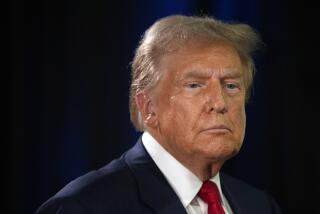Bribery Case Is Dealt Setback
- Share via
While the International Olympic Committee chose a new president in Moscow, prosecutors in Salt Lake City suffered a crucial setback Monday in their case against two men accused of lavishing IOC members with cash and gifts to secure the 2002 Winter Games.
U.S. District Judge David Sam threw out four counts of racketeering that some legal observers consider the heart of the Justice Department’s 15-count indictment against former Salt Lake bid executives Tom Welch and Dave Johnson.
The ruling put their trial, which had been scheduled to begin July 30, on hold. Sam said he will not set a new date until after he has reviewed a defense motion to dismiss the remaining 11 counts.
Welch and Johnson expressed delight at the ruling.
“We believe it confirms what we have said from the beginning: We committed no crime,” the defendants said in a joint statement. “The Salt Lake bid committee conducted its bid consistently with the advice we were given and the conduct of other successful bid cities.”
A Justice Department spokeswoman said, “[We are] reviewing the judge’s order and considering our options for appeal.”
With the Winter Games only seven months away--and the case a continuing embarrassment for the Olympic movement--Sam’s ruling drew praise from IOC officials in Moscow.
“Our view, roundly criticized by those of you with pencils at the time, was that there was no criminal activity,” said Canadian IOC member Dick Pound, who led the IOC inquiry into the matter.
Ten IOC members resigned or were expelled in the wake of the scandal and the IOC adopted a 50-point reform plan.
The case dates to when Salt Lake City sought to host the 1998 Winter Games but lost in a vote to Nagano, Japan. The Salt Lake contingent--with Welch as president and Johnson as his chief lieutenant--redoubled its efforts.
A subsequent campaign included more than $1 million in cash, gifts, scholarships and medical care given to IOC members and their relatives. In 1995, the IOC voted to give Salt Lake the 2002 Games.
It wasn’t until late 1998 that knowledge of the gifts became public. Welch had already left the Salt Lake Organizing Committee amid allegations of domestic abuse. Johnson soon resigned.
The men claimed they had only copied other successful bids and said their actions had not legally constituted bribery. In fact, because the IOC conducts secret balloting, no gifts could be tied to a specific vote.
Welch and Johnson also said other members of Salt Lake’s bid committee knew of the gift-giving.
After a federal grand jury had indicted the pair last summer, there were intense negotiations to broker a plea bargain. Olympic and Utah officials--among them Sen. Orrin G. Hatch (R-Utah)--put pressure on both sides to settle.
But talks failed and prosecutors began pressing their case based primarily on a state misdemeanor law that prohibits bribery and kickbacks in commercial dealings.
On Monday, Sam dismissed the racketeering counts, saying that law “is ambiguous and unconstitutionally vague as applied in this case.” He promised a more detailed memorandum later.
The ruling came down a week after Sam had openly questioned the merits of the case. Noting that state authorities had declined to prosecute, he wondered if the Justice Department didn’t have better things to do with its time.
If the government cannot successfully appeal, its cause will suffer because the remaining 11 fraud and conspiracy counts rely, to some degree, on proving racketeering, said Erik Luna, a University of Utah law professor.
“Do I think they could still go to trial? Yes,” Luna said. “Do I think that case is as strong? Absolutely not. This case has been gutted. It’s highly unlikely you could get a conviction.”
Speaking from Moscow, SLOC President Mitt Romney said the judge’s action was “obviously good news for Tom and Dave.” Romney reiterated his position that the men “not be subjected to criminal penalties.”
Meanwhile, defense attorneys were hopeful Sam would dismiss the remaining charges.
“The case is not over,” said William Taylor, who represents Welch, “but the judge has certainly accepted our theory.”
*
Times staff writer Alan Abrahamson contributed to this story from Moscow.
More to Read
Go beyond the scoreboard
Get the latest on L.A.'s teams in the daily Sports Report newsletter.
You may occasionally receive promotional content from the Los Angeles Times.







